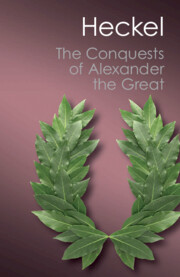Book contents
- Frontmatter
- Contents
- PREFACE
- CHRONOLOGICAL TABLE
- MAP 1 Alexander's Empire
- MAP 2 Greece and Macedonia
- 1 INTRODUCTION
- 2 HOW DO WE KNOW? SOURCES FOR ALEXANDER THE GREAT
- 3 THE MACEDONIAN BACKGROUND
- 4 THE PERSIAN ENEMY
- 5 CONQUEST OF THE ACHAEMENIDS
- 6 RESISTANCE ON TWO FRONTS
- 7 CONQUEST OF THE PUNJAB
- 8 THE OCEAN AND THE WEST
- 9 THE LONG ROAD FROM SUSA TO BABYLON
- APPENDIX 1 ALEXANDER'S OFFICERS
- APPENDIX 2 NUMBERS OF TROOPS
- APPENDIX 3 THE ADMINISTRATION OF THE EMPIRE
- GLOSSARY
- ABBREVIATIONS
- NOTES
- BIBLIOGRAPHY
- INDEX
3 - THE MACEDONIAN BACKGROUND
Published online by Cambridge University Press: 05 August 2014
- Frontmatter
- Contents
- PREFACE
- CHRONOLOGICAL TABLE
- MAP 1 Alexander's Empire
- MAP 2 Greece and Macedonia
- 1 INTRODUCTION
- 2 HOW DO WE KNOW? SOURCES FOR ALEXANDER THE GREAT
- 3 THE MACEDONIAN BACKGROUND
- 4 THE PERSIAN ENEMY
- 5 CONQUEST OF THE ACHAEMENIDS
- 6 RESISTANCE ON TWO FRONTS
- 7 CONQUEST OF THE PUNJAB
- 8 THE OCEAN AND THE WEST
- 9 THE LONG ROAD FROM SUSA TO BABYLON
- APPENDIX 1 ALEXANDER'S OFFICERS
- APPENDIX 2 NUMBERS OF TROOPS
- APPENDIX 3 THE ADMINISTRATION OF THE EMPIRE
- GLOSSARY
- ABBREVIATIONS
- NOTES
- BIBLIOGRAPHY
- INDEX
Summary
GEOGRAPHICALLY, MACEDONIA BELONGS TO THE CONTInental Balkans rather than Mediterranean Greece. The plains of Lower Macedonia, formed by the Axius (Vardar) and Haliacmon rivers, extend to the Thermaic Gulf; to these we may add the valleys of the Strymon and the Nestus, which came under Macedonian control as the kingdom began to dominate the north Aegean coast. But the river valleys lead from north to south, and they brought a steady flow of migrants from the landlocked regions of the Danube basin down into the warmer and more appealing climes of the northern Mediterranean. In the west the mountains offered only limited shelter against the Illyrian tribesmen and the Epirotes farther south; in the southeastern sector, Mt Olympus and the Peneus River (more specifically the gorge of the Vale of Tempe) formed a natural barrier between Macedonia and the Hellenized world. The Macedonian people were scattered amongst the highlands, the various cantons of what we call Upper Macedonia, and the aforementioned plain. In the lower regions the kingdom began to develop, but the highlanders remained fiercely independent and faithful to their regional barons. Hence the formation of the state, effected by Philip II in the fourth century, was a remarkable achievement.
In 513, the European campaign of Darius I, which incorporated the Thracian region into the Persian Empire, organizing it into the satrapy of Skudra, reduced the kings of Macedon to vassalage.
- Type
- Chapter
- Information
- The Conquests of Alexander the Great , pp. 13 - 30Publisher: Cambridge University PressPrint publication year: 2012



